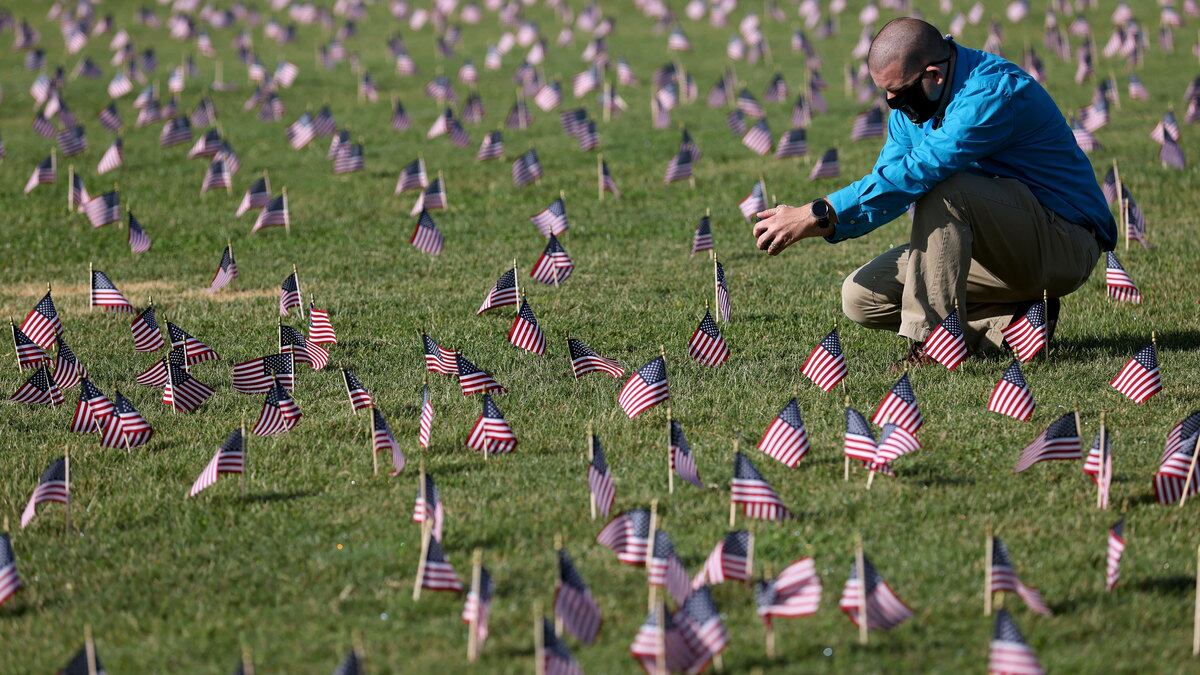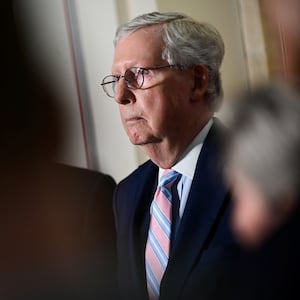A Jan. 6 commission is doomed in Washington, but outside the Beltway, a COVID commission is underway to investigate the origins of the virus, analyze and preserve lessons learned from the pandemic, and propose a path forward to handle the next pandemic.
Remarkably, this Covid Commission Planning Group hasn’t attracted the kind of partisan vitriol we’ve come to expect, and it has crucial backing from Marked by Covid, a citizens group co-founded by Kristin Urquiza, whose father died of COVID-19 last year after he was persuaded the virus was no big deal and mask restrictions were lifted in Arizona.
“My dad was a healthy 65-year-old. His only pre-existing condition was trusting Donald Trump and for that he paid with his life,” she said in a video that went viral.
ADVERTISEMENT
Urquiza worked in environmental activism before her father’s death turned her into a COVID activist seeking justice for those who perished in a health system unprepared to help them. Mark Anthony Urquiza died on June 30 after contracting the coronavirus at a karaoke bar. At his burial a week later his daughter invited reporters to attend, and then held a vigil outside the State Capitol calling on the governor of Arizona for a mask mandate.
She told The Daily Beast she was so angry about her father’s death that “I felt there was a hurricane inside my body and if I didn’t find a productive way to get it out, my health would suffer.”
She wanted a national response to the pandemic and her dream was answered in January when she got a call from Philip Zelikow, the former executive director of the 9/11 Commission, wanting to explore with her a COVID commission with a scope that would be much bigger than 9/11, which she points out took place in the course of a day while the COVID pandemic has unfurled over more than a year. By October of 2020, people were dying on the scale of 9/11 every three days, and by the end of December, the deaths from COVID delivered a 9/11 every day.
The eleventh-hour plea from the mother of a fallen Capitol Hill policeman wasn’t enough to persuade Republicans to support a bipartisan investigation into the Jan. 6 Capitol siege while the resources for a full-blown examination of the COVID crisis are being put in place at the University of Virginia’s Miller Center.
“We have been running full blast for about four months, all under the radar,” Zelikow told the Daily Beast. It was not his idea, he adds, though he is uniquely equipped to lead it, having shepherded the 9/11 Commission and before that, a bipartisan election reform commission to examine the 2000 presidential vote that was blessed by two former presidents, Jimmy Carter and Gerald Ford, and led to the creation of provisional ballots.
Zelikow was approached late last year by Eric Schmidt, the former Google CEO, who made the case for a “major taking-stock” of the pandemic that exposed gaps in the health system and the country’s ability to handle a crisis. Schmidt’s Family Foundation partnered with the Skoll Foundation, the Rockefeller Foundation and Stand Together, Charles Koch’s philanthropic arm.
“Private, ideologically diverse funding is there for a broad effort,” says Zelikow, underscoring Koch’s involvement. “He feels very strongly that the country was at war and didn’t act like it. They’re angry at that and want to fix it. When you get into the substance, the partisan lines roll away.”
Kristin Urquiza was one of the almost 200 people Zelikow and his team interviewed as they put together the components of an investigation that will cover the globe. Documenting and learning from people’s lived experiences is a major component. Kristin’s father lived in Maryvale, a neighborhood in Phoenix where 75 percent of the people are Hispanic and 35 percent are immigrants. It had the highest number of cases in the state at a time when Arizona was leading the nation and the world. In mid-June, the week her father got sick, people were waiting in line for 13 hours to get a COVID test.
“My home community was not only historically overlooked but is currently overlooked,” she said. “If I was really as committed to racial justice as I said I was, the No. 1 thing I could do was to raise awareness about health disparities in my community.”
Asked what she wants from the COVID commission, Urquiza replied, “Recognition—not only recognition of our losses but recognizing the full truth of what happened, so we don’t make the same mistake again.”
Incorporating the voices of those most directly affected is critical to any commission’s success, says former New Jersey Governor Tom Kean, the 9/11 Commission co-chair. “I called the 9/11 families the wind in our sails,” Kean told The Daily Beast. “There would not have been a commission if not for the families.”
After the attacks on the World Trade Center and the Pentagon, Congress did a cursory investigation that left a lot of unanswered questions. “It wasn’t good enough,” Kean recalls. “Both sides decided to deep-six the commission, and then the families got going. They were so furious with the whole government. They had lost husbands and children and government hadn’t done the job it should have done to protect them. Their energy was incredible. Many of them had never been to Washington, and they turned themselves into lobbyists, blocking offices and picketing the White House. They held our feet to the fire.”
Mary Fetchet was one of those newly minted activists. Her son, Brad, 24, died on the 89th floor of the second tower and the following June she spoke at a rally across from the Capitol advocating for a commission. “I naively thought once we held the rally, the government would establish the commission and we would move on,” she told The Daily Beast. “I was shocked by the resistance from the administration and also elected officials not agreeing to support a commission. It was much like what we see today.”
The families had moral authority because of their losses, and they also had tenacity. The group Fetchet founded, Voices of September 11, kept the pressure on the politicians with ongoing trips to Washington to lobby lawmakers, cornering them when possible. She recalled standing outside the White House when visitors were entering for Christmas parties. “People were standing in line, and we were out there holding signs. At some level, it was heartbreaking to see what was required of us,” she says.
“It’s a testimony to our democracy that we were able as ordinary citizens to accomplish this,” she says. The same model of citizen engagement is at work with the fledgling COVID commission, sparing it at least so far from the partisan rancor associated with a government effort. Governor Kean says he finds it “sad” that Congress is not capable of doing the kind of thorough investigation the COVID crisis demands. But everyone seems OK with the work being done outside of the government’s purview, as long as the work gets done.






